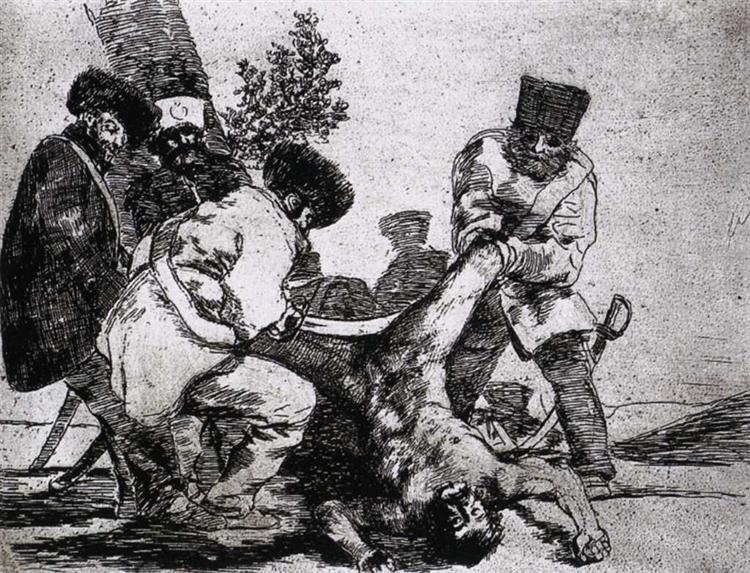Description
Francisco Goya's painting "What More Can Be Done? - 1815" is a work that encapsulates the anguish and restlessness of its time, reflecting the deep social and political concerns that the artist was confronted with. Created in the period after the Napoleonic Wars and in the context of a turbulent Spain, this work offers a penetrating look at the human condition through its dramatic composition and color palette.
In the centre of the scene, a man with worn-out features stands in a posture of total helplessness as he looks at a group of people, who in this case represent a family that appears to be on the verge of being robbed of its possessions. The man's expression suggests deep sorrow and frustration, alluding to the inability to act in a situation that seems to desperately demand a response. Goya manages to capture one of the most universal feelings of the human condition: mourning for what has been lost, and the agony of inaction in the face of the irremediable.
The colour palette used by Goya in this work is notably sombre, with earthy tones and a palette of browns and greys predominating, which underlines the tragic tone of the scene. The lighting is focused on the centre of the composition, guiding the viewer's gaze towards the unfolding conflict. Goya uses this technique masterfully, making the faces of the characters emerge almost heavenly from the darkness that surrounds them, thus lending an almost spectral quality to his depiction.
The characters in the painting are not merely isolated individuals; they become archetypes of the oppression and suffering of the civilian population, adding a psychological dimension that transcends mere historical fact. Goya, known for his ability to communicate empathy and pain, invites the viewer to experience the anguish of his subjects, turning the work into a powerful social commentary.
What More Can Be Done? also sits within the broader context of Goya's work, who throughout his career devoted himself to examining social and political injustices through his art. This work aligns with his later paintings, which deal with the themes of war and daily life amidst conflict, a recurring theme that marks his transition to Romanticism. Goya's works can be compared to those of other contemporary artists who also explored life in times of crisis, although few could achieve the emotional intensity that he achieved.
Ultimately, the work becomes a symbol of hopelessness and the struggle of the individual in the face of the inevitable. The empathy that Goya manages to evoke through "What More Can Be Done?" resonates even today, reminding us of the fragility of the human condition in the face of adversity. This piece is not only a testament to the Spanish master's creativity, but also a moving and timeless reflection on suffering and the resilience of the human spirit. In its apparent simplicity, Goya manages to convey a deeply complex message that invites the viewer to reflection and action, leaving an indelible mark on the spectator.
KUADROS ©, a famous painting on your wall.
Hand-made oil painting reproductions, with the quality of professional artists and the distinctive seal of KUADROS ©.
Painting reproduction service with satisfaction guarantee. If you are not completely satisfied with the replica of your painting, we will refund 100% of your money.

